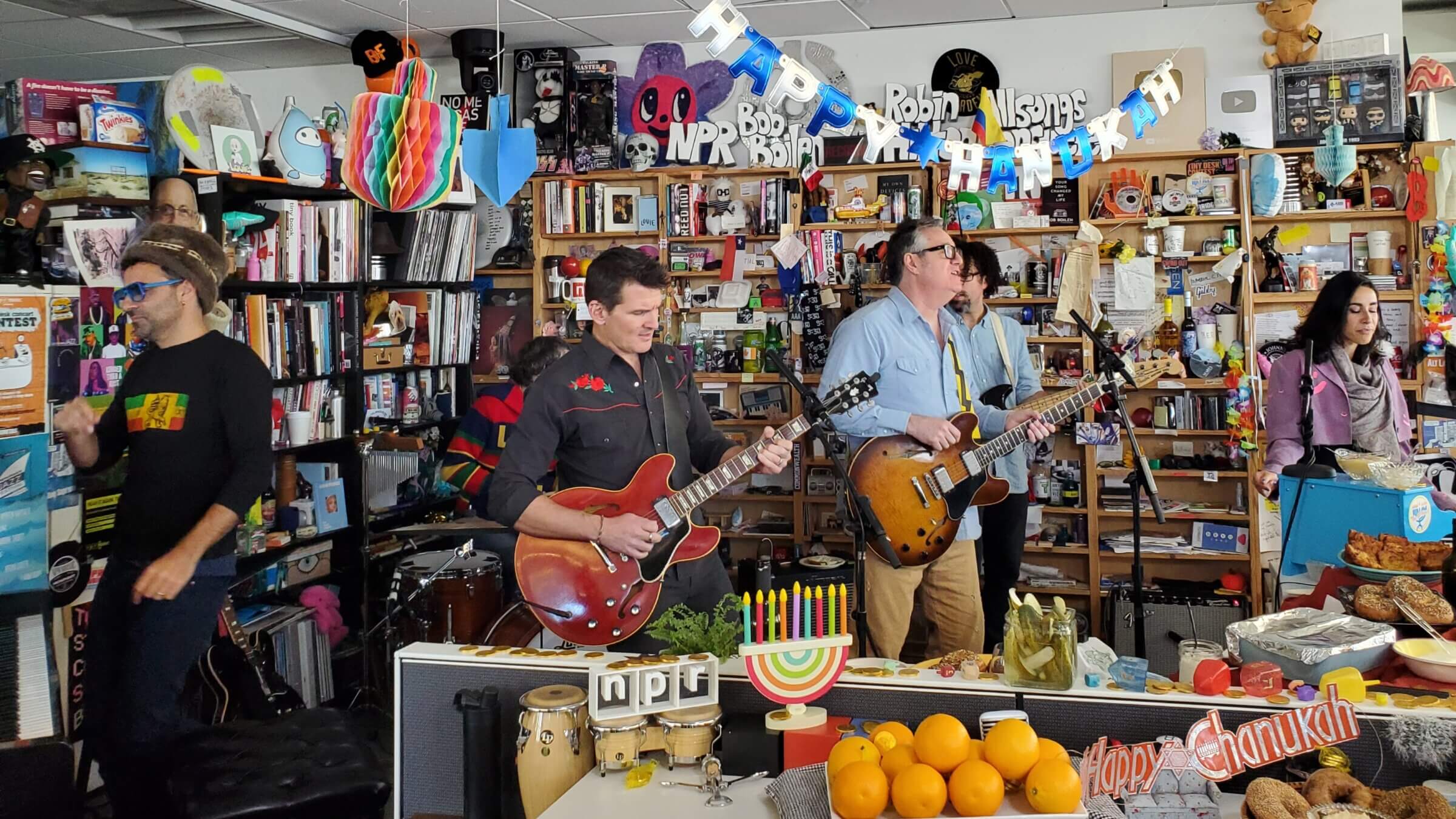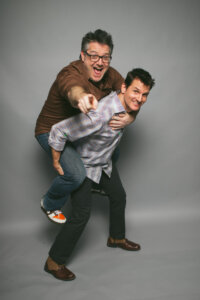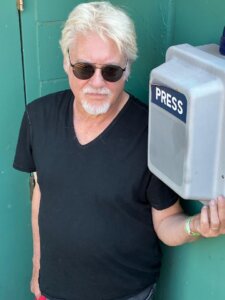Promising ‘no stupid Hanukkah songs,’ The Leevees strive for a ‘two-sauce solution’
A rock ‘n’ roll supergroup of sorts wants to reinvent Jewish holiday music

From Left: Dan Saks, Adam Gardner, Tim Walsh, Dave Schneider, Shawn Fogel, Gabrielle Lakshmi Photo by Bob Bollen
Near the end of the last century, Dec. 3, 1994, many folks got their first exposure to Hanukkah music via Adam Sandler’s “Chanukah Song” on Saturday Night Live.
Was that, perhaps, the impetus for the LeeVees, a quintet formed by Guster singer-guitarist Adam Gardner and Zambonis singer-guitarist Dave Schneider? In 2005, the duo wrote songs and recorded an album released called Hanukkah Rocks, which featured a song called “How Do You Spell Channukkahh?”

“Adam Sandler certainly wasn’t a reference point,” Gardner told me over the phone recently. “It was really more all the Christmas music and how wonderful that is and there wasn’t anything like that for Jewish people when we were growing up. And, of course, all these Christmas songs were written by Jews.”
“The Zambonis were on tour with Guster,” Schneider said in a separate interview. “And I knew two of the guys from Guster, but I didn’t know the good-looking guy, Adam. He said, ‘Hey you wanna write some songs about Hanukkah?’ and I felt like he was screwing around with me.”
Schneider did not know or think Gardner was Jewish, quipping that he thought Gardner was too handsome – “he looked like he played football for Colby.”
“That’s a weird antisemitic kind of statement, but OK,” said Gardner, responding with a laugh. “Or more self-hating.”
The genesis was 20 years ago. Guster asked the Zambonis — whose material is all about ice hockey — to open for them on a two-week tour of the midwest. Gardner and Schneider went to the back of the tour bus and, said Schneider, “literally wrote three songs in an hour: ‘Latke Clan,’ that was the first, ‘At the Timeshare,’ that’s about my mother, and then we started messing around with ‘Apple Sauce vs. Sour Cream.’”
They had no grand designs. They weren’t trying to put Hanukkah songs on a Christmas song plateau. “It was just an impetus to write songs together,” said Gardner. “We didn’t even think it would make it past the back of the tour bus when we started writing.”
They recorded the demos on a simple MBOX device and sent the songs to Guster’s manager, Dalton Sim. They got a call the next day, said Schneider, quoting Sim: “Dudes, write seven more songs and you’ll get a record deal.” They did and were signed to Reprise/Warner Bros. When the album came out, the LeeVees did a cross-country tour with the Barenaked Ladies, which at the time was doing a Christmas song-themed show.
Gardner explained that there’s a certain liberating freedom that comes with the LeeVees, a different ethos than what Guster employs. “There’s always something about holiday music that can be boundless and you can go for it in ways you wouldn’t necessarily do or I certainly wouldn’t do in Guster,” Gardner said. “You can have unabashed bombast in a holiday song, really go for it and it’s accepted, [whereas] in a rock band you might want to have a little more reserve.”
All five band members adopt the surname LeeVee, a la Ramones, when they’re in band mode. Gardner and Schneider are aided and abetted by bassist Shawn Fogel, keyboardist/banjoist Daniel Saks and, on an upcoming three-date sprint, Guster touring drummer David Butler.
The distinction between what Sandler did in the ‘90s — he recorded a sequel in 1999 — and what the LeeVees do is significant. Sandler’s songs are purely novelties. The LeeVees, said Schneider, “were really coming from a musical thing. I’m a funny guy and I come from a band that writes songs about hockey, but we really wanted to treat it like this: ‘Let’s not write stupid songs about Hanukkah; let’s write songs as if the Kinks or Elvis Costello and the Attractions or Dan Hicks were writing these songs. Let’s write some great musical songs.’”
They also expanded their repertoire from purely Hanukkah-themed tunes to songs about Jewish culture and identity.
“We really worked hard on that,” Schneider said. “We did a really good job of cutting out the fat. Some of the songs that did not make the album were definitely treated correctly to lay on the floor. Like we had a song about a plan to take over the Macarena with ‘Electronic Hanukkah’ — it was horrible.”
The LeeVees “tour” but once a year and, of course, it usually happens during the holiday season. Due to Gardner’s touring schedule with Guster, they were only able to schedule three shows this year.
“There’s also a limiting factor because of the holidays with my family and Dave’s, too,” said Gardner. “We also celebrate Christmas with our families as we married non-Jewish wives.”
The effervescent pop melodies and clever lyrics are obvious focal points of the music, but there’s a bit more heft under the surface. “I think there’s some metaphors,” said Schneider. “Like on ‘Applesauce vs. Sour Cream.’ Once you go to the chorus, it’s about life and making the right decisions and being a good person. That sneaks in. That takes away the joke when you create a beautiful chorus that isn’t about sour cream or applesauce. And ‘Kugel’ has a great vibe and also, it’s about living with your past, your family and moving into the modern age and the problems of modern day.”
“That was key to all of it.” said Gardner, picking up the thread. “We can’t just be relying on shtick. Obviously, there’s a tongue-in-cheek [element] and the double entendres, but the music is there and the playing is there and the harmonies are there. Even a song as silly as ‘Gelt Melts’ — a clear ode to the Ramones — we try to make it about a metaphor of life: ‘You gotta get it while you can/’Cause it won’t last long.’”
By the way, if you attend any of the LeeVees shows this year, you can expect a shower of chocolate gelt spewed from the stage during this song.
This year, the LeeVees show is called 2024 Hanukaj Party For All!, employing a rather uniquely incorrect spelling of the holiday. The point, though, is that it’s inclusive, and Gardner says he’s most heartened to hear from goys who dig it and discover a bit more about Jewish culture — “not that,” he hastened to say, “we’re trying to educate people.”
“We all come from families that aren’t all Jews,” Garner said. “The common ground for both of us was food. family and fun. That’s what Jewish holidays are about, especially Hanukkah. Which isn’t a particularly religious holiday anyway. And what we’re talking about goes beyond any particular religion or no religion at all.”
Gardner said the band will play “as long as it can” and that the band has more ready to go. One is “The Penny,” sparked by an incident when Schneider was 13 and another kid threw a penny on the ground in front of him to see if he’d pick it up.
Have the LeeVees faced an antisemitic backlash along the way? Some.
“We’ve been protested before,” said Schneider, adding that some years back, they “had a bomb threat in Detroit. It’s very unfortunate this world is the way it is. We say we believe in a two-sauce solution. We try to use humor to build some light and joy to the unfortunate sadness of this world.”
And, as for this year?
“I guess we’ll find out,” Gardner said.
The LeeVees play The Warehouse in Fairfield, CT, Dec. 12; The Cut in Gloucester MA, Dec. 13; and the JCC in La Jolla, CA, Dec. 15.
A message from our Publisher & CEO Rachel Fishman Feddersen

I hope you appreciated this article. Before you go, I’d like to ask you to please support the Forward’s award-winning, nonprofit journalism so that we can be prepared for whatever news 2025 brings.
At a time when other newsrooms are closing or cutting back, the Forward has removed its paywall and invested additional resources to report on the ground from Israel and around the U.S. on the impact of the war, rising antisemitism and polarized discourse.
Readers like you make it all possible. Support our work by becoming a Forward Member and connect with our journalism and your community.
— Rachel Fishman Feddersen, Publisher and CEO





















